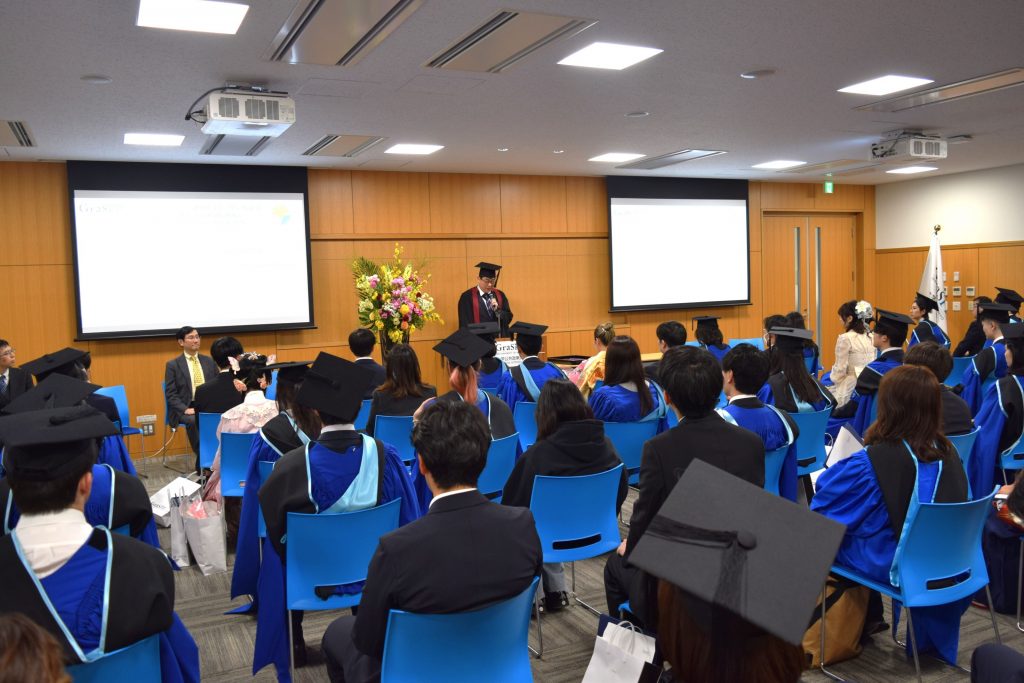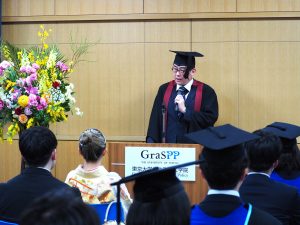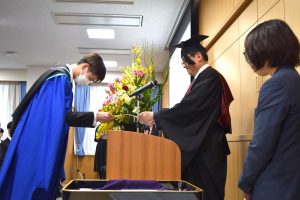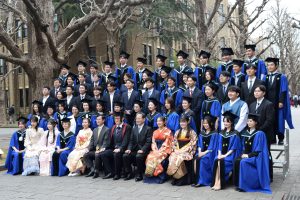
The GraSPP Spring Diploma Presentation Ceremony AY2024 took place on Monday, March 24, at SMBC Academia Hall in the International Academic Research Building.
The diploma was presented by the Dean of the Graduate School of Public Policy, who congratulated the students on completing the program together with the GraSPP staff. This spring, 73 students were conferred the diploma.
The commendation ceremony for high-achieving graduates was also held. The Best Academic Achievement Award was presented to one master’s student, and the Academic Achievement Award was presented to four master’s students.
Message from Dean Kawaguchi
I would like to congratulate you on the completion of your professional degree, and I would like to extend my warmest congratulations to you, your family members who have supported your efforts over the past two years, and all others who are present here today.
The academic year 2024 marks the 20th anniversary of the establishment of the Graduate School of Public Policy(GraSPP) at the University of Tokyo. To mark this milestone, the faculty and staff came together to redefine our mission. In the end, we decided that our mission is to improve public policy around the world. We decided that the two ways to accomplish this are to develop leaders in the field of public policy through our educational activities, and to produce and disseminate knowledge that contributes to the improvement of public policy through our research activities. As this is a redefinition of our mission, GraSPP has already been educating students with a strong awareness of developing leaders. I would like to briefly review the content of these efforts.
At GraSPP, while internationally active researchers provide advanced courses based on their knowledge in various fields of political economy, practitioners with high-level professional experience conduct project-based exercises, providing many opportunities to put advanced knowledge into practice in an environment similar to real business. Another unique feature of this leadership-focused graduate school is that many courses are offered to develop soft skills, such as leadership theory and negotiation studies. For those who wanted to deepen these studies, there were also opportunities to pursue knowledge in the form of research papers and theses. We also provided many opportunities to connect learning opportunities off campus through internships, exchange programs, double degrees, and other partnerships with various external institutions.
In an environment where half of the students are international students, I believe we have also been able to provide opportunities for international exchange on a daily basis.
I believe that each of you who is leaving today has taken advantage of the opportunities that have been provided in various ways to accumulate unique learning experiences that have been tailored to your individual needs. I believe that these experiences of moving back and forth between academia and practice will serve as a solid foundation for your future career. Another hallmark of research and education at the GraSPP is positivism. No matter how brilliantly a public policy is designed, it is meaningless if it does not work as expected. It is important to monitor whether a policy is achieving its intended goals, and if it is not working, to consider eliminating the policy or examining ways to improve it. This is the concept of evidence-based policymaking, and it is also related to the concept of agile policymaking, which changes policy as it adapts to changes in the environment.
Based on what you learn at GraSPP, I hope that you will put your knowledge into practice in your respective fields of work and, at the same time, continue to learn what you need to know in your work. GraSPP also offers an executive program, so please take advantage of these opportunities.
Next, I would like to talk about the importance of studying at the School of Public Policy at the University of Tokyo. Our double degree partners include world-class public policy schools such as Columbia University, Peking University, LSE, SciencesPo, and the National University of Singapore. What is the significance of studying at the University of Tokyo among these graduate schools? I would like you to think about the significance of studying at the University of Tokyo, one of the leading universities in Japan.
In the global political situation, many people are concerned that the two major powers, the United States and China, are turning inward, that geopolitical tensions are rising, and that the world is becoming increasingly divided. In this global situation, the importance of Japan as a non-Western country with a long history of democracy is growing. As you all know, the Meiji Restoration took place in Japan in 1868, and shortly thereafter, Emperor Meiji issued the Five Articles of Oath, which outlined the policies of the new government. The first article stated that the government should hold a broad conference and make decisions based on public opinion. The Meiji government then established a constitution, opened the Diet, and created a constitutional monarchy.
Modern Japanese history has taken many twists and turns since then, but the view that parliamentary democracy should be abandoned has never gained widespread support. Some leaders of non-Western countries may argue that democracy is a special institution established in the context of Western countries. However, Japan’s long history of democracy provides a valuable counterexample that democracy is an inclusive institution that need not be established in a Western society.
There are people of different nationalities in this seat. However, the history of modern Japanese democracy is not only open to Japanese people, but is a generality that can be shared by people of various nationalities. I hope that you will realize the importance of having studied politics, economics, and international relations at GraSPP, a leading national research and educational institution with such a history, as you go out into the international community.
We look forward to seeing you in various fields of endeavor. I hope that you will take advantage of homecoming days and other opportunities to maintain your relationship with the School of Public Policy after graduation.
That concludes my congratulatory address.

Daiji Kawaguchi
Dean, Graduate School of Public Policy, The University of Tokyo



